Powerful drama
Giannandrea Poesio
Romeo and Juliet Royal Ballet
Alessandra Ferri was in her early twenties when she became an internationally acclaimed interpreter of Kenneth MacMillan's Juliet, one of the most demanding roles of the 20th-century ballet repertoire. Her reading of the character was a young, instinctive approach which proved to the world that, contrary to general opinion, the part did not require a more mature and more experienced star. Almost 20 years later Ferri has come back to the Royal Ballet to dance Juliet. At 40, she is now an artistically complete ballerina; yet her rendition of the Shakespearean heroine has not lost the vibrancy it once had. Impressive elan, and a breathtakingly generous and somewhat dare-devil approach to both the taxing technicalities and the dramatic demands of the role are still the most noticeable qualities of an interpretation that now draws also upon a more mature idea of what star-crossed love might be.
Such a combination results in a unique use of dramatic chiaroscuro that makes the viewers gasp. Only occasionally does the more thoughtful, less instinctive approach slip into either unnecessary mannerism or excessive melodrama. This is the case in the scene where Juliet rushes to Friar Lawrence for a solution to her sorrows, and in the death scene in Act III, which on the opening night I found calculated and over the top. After all, MacMillan's choreography does not require much complementary action, for it is powerfully dramatic in itself. These reservations apart, the performance I attended was one of the most memorable in ballet history, and not just because of Fern's presence on stage.
Roberto Bolle has all the obvious qualities of the ideal Romeo: young, tall, dark and incredibly handsome. But he does not merely rely on his good looks. His acting and flawless technique are equal to Fern's outstanding qualities. His is a Romeo who is truly involved in the ongoing action and responds to every narrative nuance, as the seamless interaction with the other characters demonstrates, In addition, his Romeo grows up through the drama, without ever becoming a stereotypical ballet hero. In other words, Belle never stops being a young, and occasionally angry man who fights destiny; as such, he is not ashamed to display all his boyish frailty once destiny overwhelms him.
Ricardo Cervera as Mercutio and Ivan Putrov as Benvolio ideally complement Bolle's Romeo. Cervera — who could easily be a splendid Romeo — provides a reading of Mercutio that moves away from the conventional one. He too is tall and handsome and has none of the camp qualities of most of today's standard Mercutios. His humorous actions are appropriately refined — he is a poet and of noble extrac tion, after all and he never indulges in gratuitous histrionics, while his technical prowess is astonishing. Putrov also excels in the way he manages to inject new life into what is normally, and erroneously, dismissed as a secondary part.
Indeed, a constantly active and credible participation of all the characters in the ongoing drama was one of the main features of the performance, which was also due to superb casting. Sandra Conley gave a heartrending portrayal of the Nurse, while Zenaida Yanowski turned one of the three harlots into a dramatically complex character by adding some appropriate comic and lyrical touches to the part. This was also one of the rare occasions when Paris, often regarded as a walk-on part, came across as a credible human being, thanks to David Pickering.
The rest of the company danced and acted with gusto and bravura, thus contributing to the success of the whole evening. Now and then the corps appeared slightly untidy and out of line, but minor flaws had little impact on this excellent and unmissable revival of MacMillan's classic.


































































































 Previous page
Previous page